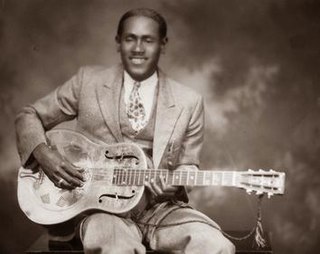Related Research Articles

"When the Levee Breaks" is a country blues song written and first recorded by Memphis Minnie and Kansas Joe McCoy in 1929. The lyrics reflect experiences during the upheaval caused by the Great Mississippi Flood of 1927.

Ishmon Bracey, sometimes credited as Ishman Bracey, was an American Delta blues singer-guitarist. Alongside his contemporary Tommy Johnson, Bracey was a highly influential bluesman in Jackson, Mississippi, and was one of the area's earliest figures to record blues material. Bracey's recordings include "Trouble Hearted Blues" and "Left Alone Blues", both of which appear on several compilation albums.

Frank Stokes was an American blues musician, songster, and blackface minstrel, who is considered by many musicologists to be the father of the Memphis blues guitar style.
H. C. Speir was an American "talent broker" and record store owner from Jackson, Mississippi. He was responsible for launching the recording careers of most of the greatest Mississippi blues musicians in the 1920s and 1930s. It has been said that, "Speir was the godfather of Delta Blues" and was "a musical visionary". Without Speir, Mississippi's greatest natural resource might have gone untapped."

"Rollin' and Tumblin'" is a blues standard first recorded by American singer-guitarist Hambone Willie Newbern in 1929. Called a "great Delta blues classic", it has been interpreted by hundreds of Delta and Chicago blues artists, including well-known recordings by Muddy Waters. Rock musicians usually follow Waters' versions, with the 1960s group Cream's rendition being perhaps the best known.

Alger "Texas" Alexander was an American blues singer from Jewett, Texas. Some sources claim that he was the cousin of Lightnin' Hopkins, but no direct kinship has been established. It has also been asserted that he was the uncle of the Texas country blues guitarist Frankie Lee Sims.
William "Hambone Willie" Newbern was an American guitar-playing country blues musician.

Jim Jackson was an American blues and hokum singer, songster, and guitarist, whose recordings in the late 1920s were popular and influential on later musicians.

"Jim Jackson's Kansas City Blues" is a 1927 song, written and recorded by the American blues musician Jim Jackson. He recorded it on October 10, 1927 for Vocalion Records, who released it as a two-part A-side and B-side single. It was Jackson's first record and an early blues hit. Music writer Peter Silvester suggests it was one of the first million-seller records. This sales figure is disputed, but the recording was "immensely popular... and became a standard among Mississippi and Memphis bluesmen".

"The Memphis Blues" is a song described by its composer, W. C. Handy, as a "southern rag". It was self-published by Handy in September 1912 and has been recorded by many artists over the years.
Rubin "Rube" Lacy was an American country blues musician, who played guitar and was a singer and songwriter.
Mattie Delaney was an American Delta blues singer and guitarist active in the 1930s. Only two recordings by her are known: "Down the Big Road Blues" and "Tallahatchie River Blues".
Lottie Kimbrough was an American country blues singer, who was also billed as Lottie Beaman, Lottie Kimborough, and Lena Kimbrough.
Freddie Spruell was an American Delta blues guitarist and singer, variously billed as Papa Freddie or Mr. Freddie. He is generally regarded as the first Delta bluesman to be recorded, although Mamie Smith (1920), Ed Andrews (1923) and Blind Lemon Jefferson (1925) predated him in recording the first blues records. Details of his life are sketchy and sometimes contradictory.

Willie "Poor Boy" Lofton was an American Delta blues singer-guitarist. He recorded eight sides for Decca Records and Bluebird Records, adopting a style strikingly similar to Tommy Johnson's. Lofton never achieved much commercial success or recognition in his lifetime, but his rendition of Johnson's "Big Road Blues" has been revitalized on compilation albums.
Walter "Buddy Boy" Hawkins was an American country blues guitarist, singer, and songwriter. He recorded only 12 songs, between 1927 and 1929, but Paul Oliver opined that "Hawkins was a major figure in black country music". AllMusic noted that he was "one of the most distinctive country-blues performers of the pre-war era, a gifted vocalist whose taste for slow, dirge-like songs was ideally suited to his intricate guitar work."
Walter Rhodes was an American blues musician, who recorded briefly in the late 1920s and was unusual in being a blues accordionist and singer from Mississippi. It was reported that Rhodes may have been the oldest Delta musician recorded. Little is known of his life outside of his recordings.
Richard "Hacksaw" Harney was an American Delta blues guitarist and pianist. He first entered a recording studio with his brother Maylon in 1928, to wax guitar work backing for separate tracks by Pearl Dickson and Walter Rhodes. However, Harney recorded rarely, until his belated solo album, Sweet Man (1972).
References
- 1 2 "William Harris Albums: Songs, Discography, Biography, and Listening Guide". Rate Your Music. 2003-08-26. Retrieved 2017-01-07.
- 1 2 Komara, Edward, ed. (July 2004). The Blues Encyclopedia. Routledge. p. 413. ISBN 9781135958312 . Retrieved 2017-01-07.
- 1 2 "WILLIAM HARRIS". thebluestrail.com. Retrieved November 16, 2022.
- 1 2 3 Komara, Edward (2004). The Blues Encyclopedia. Routledge. p. 413. ISBN 9781135958312.
- 1 2 3 4 5 6 7 8 Ankeny, Jason. "William Harris: Biography". AllMusic.com. Retrieved 2017-01-07.
- ↑ Mann, Woody. "Country Blues at Berklee College of Music". Woodymann.com. Retrieved 2017-01-07.
- ↑ "William Harris: Big Road Blues". Sundayblues.org. Retrieved 2017-01-07.
- 1 2 3 Yanow, Scott. "William Harris, Complete Recorded Works in Chronological Order 1927–1929: Songs, Reviews, Credits". AllMusic.com. Retrieved 2017-01-07.
- 1 2 "William Harris". Thebluestrail.com. Retrieved 2017-01-07.
- ↑ Calt, Stephen; Miller, John (c. 1975). Notes to Lonesome Road Blues: 15 Years in the Mississippi Delta, 1926–1941. LP Yazoo L-1038.
- ↑ "Catfish Blues". Earlyblues.com. Retrieved 2017-01-07.
- ↑ Gioia, Ted (2009). Delta Blues: The Life and Times of the Mississippi Masters Who Revolutionized American Music . New York: W. W. Norton. p. 56. ISBN 978-0393337501 . Retrieved 2017-01-07.
william harris. blues.
- ↑ "Illustrated William Harris Discography". Wirz.de. Retrieved 2017-01-07.